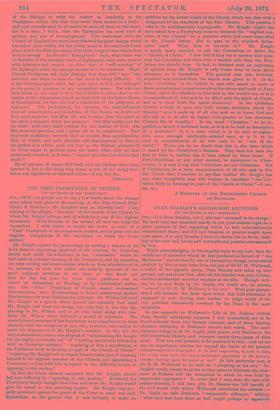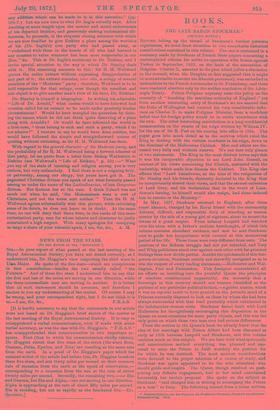DEAN STANLEY'S EDINBURGH LECTURES.
[TO THE EDITOR OF THE "SPEOTATOB.1
SIR,—It is Dean Stanley, not I, who has "returned to the charge."' My brief note was intended merely to put your readers right on a plain question of fact regarding which he had unintentionally misinformed them ; and if I now trespass at greater length upon your space, it is only because I have no choice but to do so, look- ing to the new and, let me add extraordinary position now assume& by him.
While acknowledging, in his lengthy reply to my note, that the- certificate of character which he had produced in favour of "the Moderates" was written by one of themselves, though twice stated publicly by him to have been from the pen of Sir H. M. Wellwood, a leader of the opposite party, Dean Stanley now takes up new ground, and maintains that, after all, his blunder was only in form, and that substantial accuracy remains on his side. Though writ- ten, as he now finds, by Dr. Inglis, the words are, he asserts, "adopted by Sir II. M. Wellwood as his own." With your permis- sion I will examine the, facts upon which this bold statement is supposed to rest, leaving your readers to judge which of the two positions successively assumed by the Dean is the more untenable.
In the appendix to Wellwood's Life of Dr. Erskine (which Dean Stanley mistakenly supposes I had overlooked) are to be found extracts from two funeral sermons, each of them bearing eloquent testimony to Erskine's talents and worth. The more elaborate eulogy is by Dr. Inglis, joint pastor with Erskine in the Old Greyfriars Church, and occupies nearly three pages of close print. Now the real question to be answered is this,—and let me say its importance reaches far beyond the limits of the present controversy—is a biographer to be held responsible, in such a case, for every mew and even every incidental expression in the extract,. whether bearing upon his point or not? In this particular ease, is Sir H. M. Wellwood to be held as "adopting as his own" Dr. Inglis's words, except in so far as they serve to illustrate the char- acter of Erskine and the estimation in which he was held by respectable opponents ? In order that I may state the case with perfect fairness, I will here give Dr. Stanley the full benefit of the civil words with which Wellwood introduces the extracts :- Dr. Inglis he calls Erskine's "respectable colleague," adding, "what such men have done so well ought perhaps to supersede any addition which can be made to it in this narrative." (pp. S96-7.) " Let me now turn to what Dr. Inglis actually says. After dwelling at some length upon the mental and moral endowments of his departed brother, and generously sinking ecclesiastical dif- ferences, he proceeds, in the eloquent closing sentence with which we are now familiar to give Erskine a place among the worthies of his (Dr. Inglis's) own party who had passed away, as 4' embalmed with them in the hearts of all who had learned in any measure to value whatever has been most respectable in our Zion," &c. This is Dr. Inglis's testimony to Dr. Erskine, and I invite special attention to the way in which Dr. Stanley deals with it. His reasoning amounts to this : Sir H. M. Wellwood quotes the entire extract without expressing disapprobation of any part of it ; the extract contains, inter alio, a eulogy of several members of the " Moderate " party ; therefore, Wellwood is to be held responsible for that eulogy, even though his manifest and sole object is to give another man's view of his hero, Dr. Erskine Dr. Stanley is himself a biographer. In writing his admirable 4 4 Life of Dr. Arnold," what course would he have followed had occasion called for an extract to be made under precisely similar circumstances? Would he have mangled the quotation by delet- ing the names which he did not think quite deserving of a place along with Arnold's ? Or would he have informed the world in a foot-note, "these belong to such and such a party, which I do not admire?" I venture to say he would have done neither, but would have followed the simple and straightforward course of quoting without criticising, as Sir H. M. Wellwood has done.
With regard to the general character of the Moderate party, and the probability of Sir H. M. Wellwood being a fervent admirer of that party, let me quote from a letter from Bishop Warburton to Erskine (see Wellwood's "Life of Erskine," p. 55) :—" What you say of the state of learning and religion among you is very curious, but very melancholy. I find there is not a reigning folly, or perversity, among our clergy, but yours have got it. The paganised Christian divines you speak of are what formerly passed among us under the name of the Latitudinarian, of late Ban gorian divines. But Socinus lies at the root. I think Toland was not much out when he said, the Mahometans were a sort of Christians, and not the worst sort neither." That Sir H. M. Wellwood agrees substantially with this picture, while criticising some of its detals, he does not leave us in doubt. At the same time, no one will deny that there were, in the ranks of this same ecclesiastical party, men for whose talents and character he justly entertained a high respect. With many apologies for occupying so large a share of your valuable space, I am, Sir, &c., A. M.



































 Previous page
Previous page